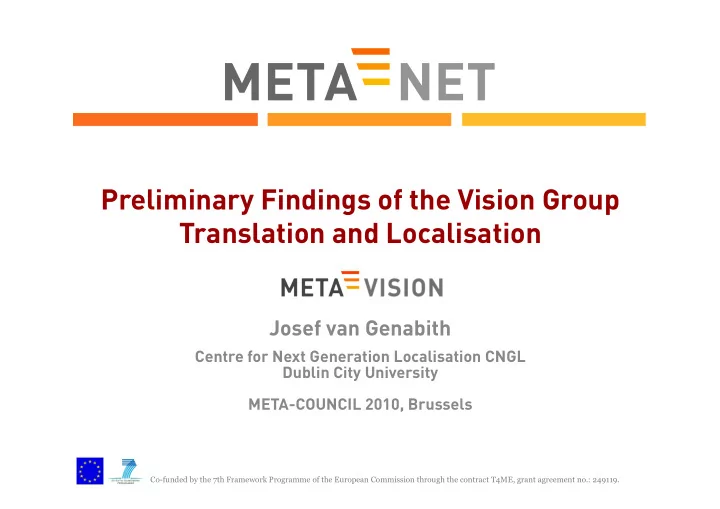

Preliminary Findings of the Vision Group Translation and Localisation Josef van Genabith Centre for Next Generation Localisation CNGL Dublin City University META-COUNCIL 2010, Brussels Co-funded by the 7th Framework Programme of the European Commission through the contract T4ME, grant agreement no.: 249119.
About the Speaker q Josef van Genabith q Director: Centre for Next Generation Localisation (CNGL) q Professor School of Computing, Dublin City University (DCU), Ireland q Founding member of META 16 Nov. 2010 META-COUNCIL 2010, Brussels 2
Vision Group Translation and Localisation q Fields: Technical documentation, consumer information, official bulletins, user interface localisation, translation services, information gathering, user-generated content etc. q Stakeholders: Software companies, large users of translation and localisation services, Language Service Providers, translators, customers, consumers, citizens etc. q Organizers: § Hans Uszkoreit (DFKI, Germany) § Josef van Genabith (DCU/CNGL, Ireland) q Meetings: 1. Berlin, 23 July 2010 2. Brussels, 29 September 2010 16 Nov. 2010 META-COUNCIL 2010, Brussels 3
Needs 16 Nov. 2010 META-COUNCIL 2010, Brussels 4
Demand and Observations q Translation is an emotional topic that needs to be handled with care. q Despite progress, the problem of HQMT remains unsolved, often “quality” still is a major problem. q Translation is not only a linguistic business: § Context and common sense knowledge play a decisive role. § The value is in the information, entertainment, etc., not in the translation itself. q Translation workflows and business models are not up-to-date: Data and software migration are very difficult. § In some areas too many documents are translated with no real need. § § A lot of money is wasted non-productively! § Customers self-service on WEB, user-generated data § Lack of personalisation § The mobile WEB 16 Nov. 2010 META-COUNCIL 2010, Brussels 5
Visions 16 Nov. 2010 META-COUNCIL 2010, Brussels 6
New Workflows Different demands require customised solutions , e.g.,: Personali- Trust/ sation/ Time Costs Security Quality corporate ID Outbound high quality translation Not Can be Highest Medium possible Important (corporate, manuals, PR critical costly material, etc.) ¡ Inbound cross-lingual Must be Must be affordable High Medium Not needed information gathering ¡ fast Translation for private Near Must be Medium Medium Would be a users (online content, realtime cheap to Low plus communication) ¡ 16 Nov. 2010 META-COUNCIL 2010, Brussels 7
New Workflows ctd. Example of a new workflow: going upstream § Many (if not most) problems arise from the poor quality of source texts to be translated (spelling and grammar errors, ambiguity, missing context, terminology etc.) § User-generated content … § Integration of content production and translation on demand Content Content Content Generation Transformation Delivery 16 Nov. 2010 META-COUNCIL 2010, Brussels 8
New Architectures q New MT technology and infrastructure § Drawing on (artificial) knowledge heavily (user needs, context, task, ambient semantics, web, etc.) with machine learning § Sharing of data and resources: Standards, interoperability, agile workflows! q Translation brokering § Brokering service sends input to domain/language/style/genre/cor- porate/user/etc. adapted services § Cloud of highly specialised LT/MT services § Interoperable components, connected by highly adaptive workflows § SMEs as well as big companies offer/use specialised LT/MT services § On demand § Transparent cost calculation 16 Nov. 2010 META-COUNCIL 2010, Brussels 9
Translation Brokering Specialized MT/LT Web Service Cloud Annual Reports Patents PR Brochures Times and Trusted Places Int. Informal Transl. Company Language Broker Names Automatic Human Summarization Post-Editing 16.11.2010 META-COUNCIL 2010, Brussels 10
Research and Training q New Human-Centred Research Paradigm in MT: § Human Factors: § Truly hybrid processes of machines (robots?) and humans § Humans as providers of data, insights, quality judgements, critique, etc. § Humans as test users and evaluators of early MT prototypes q New training for pre- and post-editing of MT texts (missing in current curricula for translators) q MT/LT students should be trained in translation. 16 Nov. 2010 META-COUNCIL 2010, Brussels 11
Topics with Visionary Potential q Domain specific § More knowledge sources in MT (and machine learning) § New modes of research studying and involving translating humans § A new role for the human in the machine translation process q Domain independent § New, transparent business models: mobile WEB, user-generated content § New computing/deployment models/workflows: - Interoperable plug & play components - Adaptive, agile workflows § New ways of sharing resources and knowledge in R&D 16 Nov. 2010 META-COUNCIL 2010, Brussels 12
A Final Vision: Ambient Translation Projection 16/11/2010 13
Recommend
More recommend